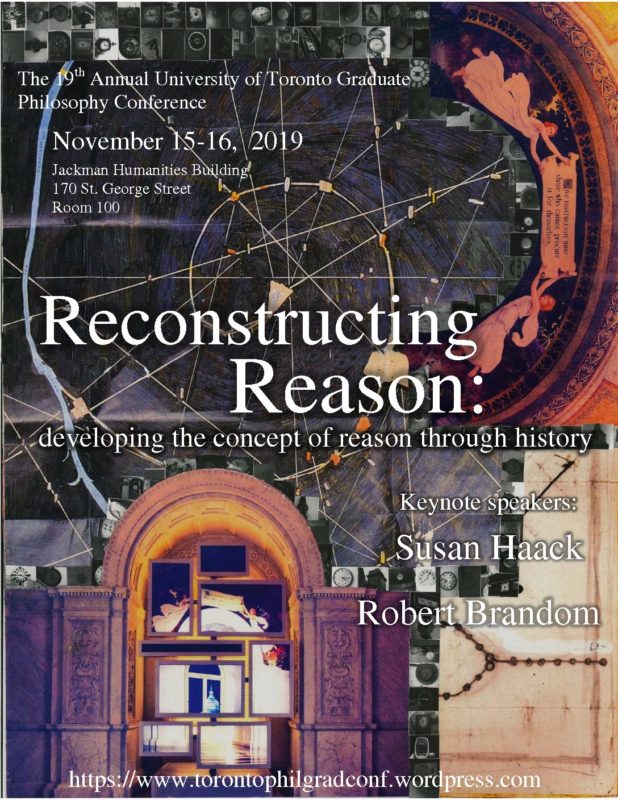We are glad to give notice of the forthcoming Annual University of Toronto Graduate Conference in Philosophy Reconstructing Reason: Developing the concept of reason through history. The conference will take place on 15th-16th November 2019 at the Department of Philosophy of the University of Toronto. The call for papers has been send out.
Submission deadline: September 6th, 2019.
Below you can find the description of the conference, the list of the speakers and the text of the call from the website of the event.
***
The Department of Philosophy at the University of Toronto is pleased to announce the nineteenth annual Graduate Philosophy Conference, to be held November 15-16, 2019 in Toronto, Ontario. Our theme this year is ‘Reconstructing Reason: Developing the concept of reason through history’. The conference invites submissions from graduate students working in all areas in philosophy that relate to the conference’s main themes.
Keynote Speakers
Robert B. Brandom (University of Pittsburgh). Robert Brandom works in the philosophy of language, logic, German idealism, and neo-pragmatism. His theory of reasoning known as “inferentialism” has been widely influential both inside and outside the discipline and treats many of the leading issues in contemporary philosophy in a way that is both systematic and historically illuminating. Dr. Brandom’s most recent book, A Spirit of Trust, gives a new and provocative interpretation of the distinctively social and historical development of reason in Hegel’s Phenomenology of Spirit.
Susan Haack (University of Miami). Susan Haack is a leading figure in the philosophy of science, language, logic, and epistemology. Her work – deeply influenced by the American pragmatist tradition – encompasses both philosophical and legal concerns regarding the nature of evidence, belief, reasoning, and truth. Her books include Defending Science—Within Reason and Evidence Matters: Science, Proof, and Truth in the Law. Dr. Haack’s recent work documents the fascinating way social and historical circumstances influence the development of the meaning of scientific and legal concepts and shows how this tendency can inform our understanding of rationality.
Conference Description:
What is reason? Although the concept of ‘reason’ has been central to the practice and self-conception of philosophy throughout its history the way philosophers have understood this concept has changed dramatically over time. Ancient Greek philosophers like Plato and Aristotle, conceived reason as a metaphysical principle of the world. Early Moderns like Descartes and Kant viewed ‘reason’ as a faculty of the human mind. Today, many philosophers conceive reason – and its sibling, ‘science’ – as one instrument or method among others whose authority may wax and wane with changing circumstances. In this conference, we explore the history behind the development of the concept of reason and investigate the relevance of this history to contemporary philosophy.
We welcome submissions that address any questions related to our theme. Possible topics may include (but are not limited to):
- Changing conceptions of reason through history.
- The relationship between history and epistemology.
- The relationship between pluralism and relativism.
- The role of genealogy in historical explanations.
- The role of social relations, recognition, and intersubjectivity in reasoning.
- Our rational relationship to past and future generations.
- Reason in the pragmatist tradition.
- The Kantian and post-Kantian ideal of the unity of reason.
- Style’s of reasoning in the history and philosophy of science.
- Reason in the social sciences vs. reason in the natural sciences
We conceive of the conference’s theme very broadly and welcome submissions from all areas in philosophy that relate to the conference’s main themes.
Deadline for Submission: September 6th, 2019
Submissions: Please send submissions to torontophilgradconf@gmail.com. Submissions must be from graduate students, sent in PDF format, and prepared for blind review. Papers should not exceed 4000 words, and should include an abstract not exceeding 300 words. In your email, please include your name, paper title, and institutional affiliation. Only one submission per author. Limited travel stipends are available. Authors will be notified of decisions by September 22nd, 2019.
For further information regarding the call, please visit the website of the conference.

